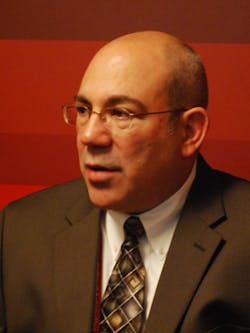How the modern DCS truly distributes control
The traditional distributed control system (DCS) is actually a monolithic system, with control distributed across the plant through proprietary networks that began as 4-20 mA signals on twisted pairs of wires. Over the years, the hardware, software and networks have become increasingly sophisticated, digital and powerful, but with few exceptions, control is still done in centralized controller and computer racks.
The PlantPAx DCS is naturally different, according to Jim Winter, director, global process business, Rockwell Automation.
“PlantPAx evolved from the plant-wide integration of many systems—motion, mechanical safety, process safety, process control—running on common and compatible hardware and software,” said Winter in an interview at the company’s Automation Fair event this week in Chicago.
“The use of common software reduces capital expenditures, because the same packages, training and expertise can be used on all the systems, and using common hardware reduces operational expenses for maintenance and spare parts,” Winter said. “It’s scalable, because the same systems used on a skid can be integrated to control the entire plant—skid-level batch control is available, as is plant-wide batch. And it’s connected through EtherNet/IP, a single, standard network for everything.”
“The same system used on a skid can be integrated to control the entire plant.” Jim Winter of Rockwell Automation explained why the company’s PlantPAx DCS offers unprecedented scalability for process applications.
“PlantPAx was founded on inexpensive, powerful processors and fast, open networks,” added Stephen Pulsifer, global director, process market development, Rockwell Automation. “So instead of a centralized system, we have highly distributed and networked controllers. We recently refreshed all our processors, so they’re faster than ever."
Flexible delivery
The Rockwell Automation DCS is also distinguished by the company’s flexible delivery system. “Customers can do it themselves, or they can work with our partners, distributors or use our experts,” said Winter. This network of suppliers expands the company’s reach. “Wherever you are, around the world, there’s someone close by who knows your equipment and your application,” Winter said.
To see the Rockwell Automation difference, consider the process of engineering and building a plant, he added. “Your equipment suppliers can build their machines and skids, install and test the control systems, and when they arrive, you can quickly and easily integrate them in the plant.”
This same modular philosophy extends through the company’s Encompass Partner program all the way up to its Strategic Alliance partners. “For instance, you can build an Endress+Hauser analyzer into our system with a predesigned faceplate,” he said. “With so many partners, this gives customers freedom of choice and flexibility."
Advanced process control
Importantly, the Rockwell Automation building-block approach to distributed control does not limit the sophistication of its applications. For example, “Our model predictive control (MPC) offers the most powerful models—empirical, first-principle, non-linear, hybrid—and they run inside the controllers,” said Jim Miller, Pavilion business director, Rockwell Automation. “These are not scaled down models with 4x4 or 5x5 matrices. We’ve run as many as five 10x10 matrices, and we can run them fast.”
Those five models can be spread across applications, and for the user there’s no complex modeling. “We made it easy,” said Miller. “Other companies have only a few super-smart guys who handle advanced control, but Rockwell Automation has a lot of people who can do this because you don’t have to have a PhD.”
Advanced control traditionally runs on a separate computer, outside the control system, added Pulisfer. “Moving MPC from a server into a controller makes it more rugged, more robust, and faster, with sub-second cycle speeds. It’s opening up advanced control to applications where you wouldn’t expect it.”
Continuous path to improvement
“PlantPAx is a modern DCS, it’s not 20 years old,” said Winter. “It possesses all of the core capabilities expected of a DCS, but we still continually talk to our customers to see how we can improve upon the system. For example, the latest Studio 5000 development software enhances our capabilities.
“We’re empowering the information layer, making it easy to publish critical data and visualize it—truly helping to achieve a Connected Enterprise,” Pulsifer said. “Mobility brings information to people where and when they need it—we’re working on tailoring that information by location, adding diagnostics and recommending responses.”
Pulsifer added that Rockwell is working with Cisco on security at all levels using commercial, off the shelf (COTS) technology, adapting and evolving as required. “There’s no way we can design security today, leave it static, and expect it to meet security threats five years down the road,” he said. “Commercial applications are among the most robust, and using COTS lets us move forward quickly.”
About the Author
Paul Studebaker
editor in chief

Leaders relevant to this article:



